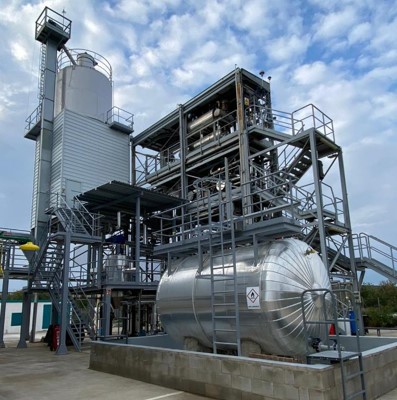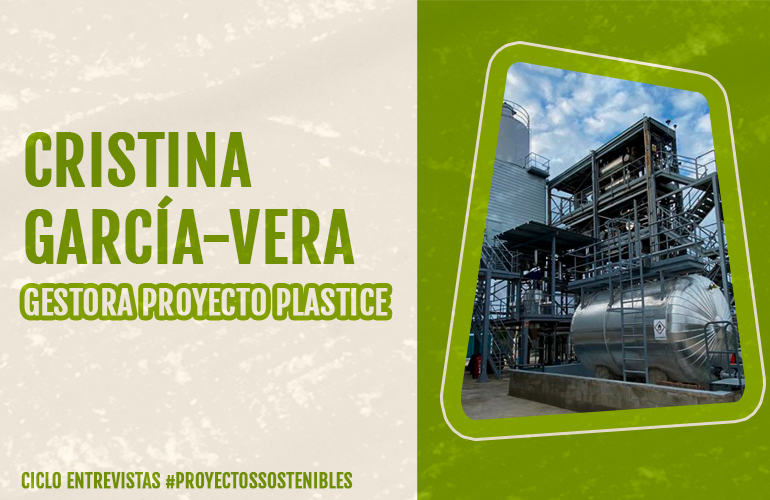En ABN abanderamos el compromiso con la sostenibilidad y la economía circular. Por ello, hemos iniciado un ciclo de entrevistas con profesionales de diferentes industrias para dar a conocer diferentes proyectos sostenibles al servicio de la sociedad.
La primera entrevista es a Cristina García-Vera, gestora del proyecto PLASTICE en la empresa Urbaser. Esta es una de las compañías líder a nivel mundial en soluciones medioambientales. Se trata de una empresa global orientada a potenciar el valor de los recursos del planeta que busca “construir un mañana más sostenible”. La compañía da servicio a más de 70 millones de personas en 15 países a través de una red de más de 50.000 empleados y 150 plantas que impulsan “una circularidad real”.

“El proyecto Plastice está liderando la revolución en la valorización de plásticos mediante la pirólisis asistida por microondas”
Cristina García-Vera. Urbaser
P: En Urbaser tenéis tres áreas de negocio diferenciadas (servicios urbanos, tratamiento de residuos urbanos y soluciones industriales) y trabajáis la sostenibilidad y la innovación en todas ellas. ¿Qué importancia tiene la sostenibilidad en la estrategia global de la empresa y a la hora de plantear nuevos productos y soluciones?
R: Desde Urbaser consideramos que la innovación y el conocimiento son las principales fuentes de crecimiento económico y prosperidad compartida. Cabe resaltar el empeño constante de la compañía por hacer de la economía circular el catalizador de nuestra cultura de innovación. Concepto al que se destina más del 74% de nuestra inversión en innovación y que materializa nuestra misión “Making circularity real”.
Urbaser pretende ser ejemplar en su comportamiento, reforzando su desempeño sostenible y aumentando su impacto positivo social y ambiental. Esto nos permite poner en marcha iniciativas como la primera planta de reciclaje de baterías de vehículos eléctricos en la Península Ibérica o el desarrollo de la primera biorrefinería de residuos urbanos de Europa.
P: Recientemente, además, habéis recibido el Premio Nacional de Innovación 2023. ¿Cómo de importante consideráis que es la innovación para participar y liderar proyectos sostenibles en vuestro sector?
R: La innovación es una herramienta clave que nos permite convertirnos en una aceleradora de técnicas avanzadas y de vanguardia, cumpliendo con la normativa vigente e incrementando la sostenibilidad de toda nuestra actividad.
Gracias a la puesta en marcha de acciones de I+D+i desarrolladas en colaboración con proveedores, universidades y centros públicos y privados de investigación, conseguimos contribuir de forma directa y tangible a la sostenibilidad de todo nuestro entorno.
Por sus más de veinte años de actividad innovadora Urbaser se ha convertido en una empresa líder en el sector y por ello hemos sido galardonados con el Premio Nacional de Innovación 2023 del Ministerio de Ciencia e Innovación. Este reconocimiento refleja nuestro compromiso estratégico con la innovación y nuestro liderazgo en la gestión medioambiental y la economía circular a nivel internacional. Un compromiso que se materializa en la promesa de continuar impulsando la innovación en nuestra actividad en los años venideros.
P: En este sentido, sois parte activa del proyecto PLASTICE, iniciativa en la que colaboráis para encontrar rutas de valorización de plásticos para obtener materias primas sostenibles con las que producir nuevos plásticos. ¿Qué objetivo perseguís aliándoos en este proyecto con otras empresas e instituciones educativas y científicas?
R: Dentro de las líneas estratégicas de innovación de Urbaser, se encuentra la Innovación en los procesos para el tratamiento de residuos bajo el concepto de economía circular.
En concreto, desde el año 2009 Urbaser apuesta por desarrollar una tecnología propia de pirólisis de residuos plásticos urbanos con el fin de obtener, en una idea inicial, biocombustibles y, posteriormente, líquidos pirolíticos que puedan ser reintroducidos en la industria de la fabricación de plásticos.
Dentro de su objetivo inicial, hemos conseguido validar, a través del proyecto 3R2020+, la obtención de combustible diésel apto para automoción. Posteriormente se ha investigado en la validación técnica y económica del proceso de transformación de plásticos en nuevas materias primas de forma continua a escala demostrativa.
En línea de este segundo objetivo nos alineamos con el centro tecnológico Circe, desarrollador de una nueva tecnología de pirólisis asistida por microondas, y TotalEnergies como validador del producto final obtenido, entre otros socios para dar cabida al proyecto PLASTICE “Nuevas tecnologías de integración de residuos plásticos en la economía circular” y con ello seguir contribuyendo a la mejora y optimización de nuestros procesos de recuperación de recursos para transformarlos en productos de mayor valor añadido.
P: PLASTICE se desarrolla en tres rutas diferentes para la valorización del plástico y Urbaser estáis involucrados en la primera de ellas: pirólisis asistido por microondas. Como expertos en esta área, ¿cuál es vuestra función en PLASTICE?
R: En este escenario, la tecnología de calentamiento asistido por microondas se posiciona como una alternativa con un elevado potencial para solventar las limitaciones de los procesos de pirólisis convencional y, en particular, para la valorización de plásticos difícilmente reciclables.
Además, ofrece diferentes ventajas respecto a los procesos de calentamiento convencionales como la reducción de los tiempos de procesado y las pérdidas de calor y la posibilidad de electrificar el proceso y operarla con energía renovable, con su consiguiente recorte de emisiones contaminantes. Nuestra misión es demostrar la viabilidad de esta tecnología en un futuro próximo.
P: ¿Qué pasos habéis dado y en qué punto se encuentra el proyecto PLASTICE?
R: El proyecto PLASTICE, financiado por la Comisión Europea con 15 millones de euros y coordinado por Circe, va a implantar este proceso de pirólisis asistida por microondas para valorizar mezclas difícilmente separables de plásticos.
El proceso se encuentra en una etapa de validación intermedia que servirá para optimizar la influencia de los parámetros y ajustar las condiciones óptimas de operación para su escalado en la planta piloto del Centro de Innovación Tecnológica de Residuos “Alfonso Maillo” (CIAM) que opera Urbaser en Zaragoza.
P: ¿Cómo se van a implementar los resultados de PLASTICE?
R: El proyecto PLASTICE se encuentra en su segundo año de ejecución y terminará en el segundo trimestre de 2026. PLASTICE pretende desplegar elementos innovadores a lo largo de toda la cadena de valor con el objetivo de integrar tecnologías ecológicas para que los nuevos procesos sean sostenibles y cerrar el ciclo para generar cadenas de valor circulares en torno a los plásticos (incluidos los textiles con contenido de plástico).
El proyecto además trabaja en procesos de valorización, integrando nuevos sistemas de clasificación, herramientas de digitalización y principios de ecodiseño. Siguiendo este enfoque, PLASTICE tendrá un impacto en la cantidad de plásticos vertidos y en la reducción de emisiones de gases de efecto invernadero vinculadas a la operación del proceso, así como la reducción de materias primas basadas en combustibles fósiles. Su replicación se apoyará contribuyendo al desarrollo de nuevos estándares y regulaciones, y creando una comunidad de seguidores apoyada por las herramientas y el consorcio PLASTICE.
